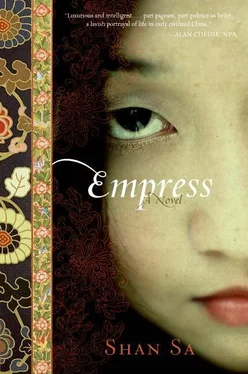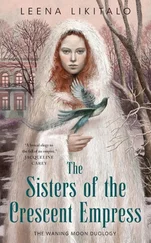Shan Sa - Empress
Здесь есть возможность читать онлайн «Shan Sa - Empress» весь текст электронной книги совершенно бесплатно (целиком полную версию без сокращений). В некоторых случаях можно слушать аудио, скачать через торрент в формате fb2 и присутствует краткое содержание. Жанр: Историческая проза, на английском языке. Описание произведения, (предисловие) а так же отзывы посетителей доступны на портале библиотеки ЛибКат.
- Название:Empress
- Автор:
- Жанр:
- Год:неизвестен
- ISBN:нет данных
- Рейтинг книги:5 / 5. Голосов: 1
-
Избранное:Добавить в избранное
- Отзывы:
-
Ваша оценка:
- 100
- 1
- 2
- 3
- 4
- 5
Empress: краткое содержание, описание и аннотация
Предлагаем к чтению аннотацию, описание, краткое содержание или предисловие (зависит от того, что написал сам автор книги «Empress»). Если вы не нашли необходимую информацию о книге — напишите в комментариях, мы постараемся отыскать её.
Empress — читать онлайн бесплатно полную книгу (весь текст) целиком
Ниже представлен текст книги, разбитый по страницам. Система сохранения места последней прочитанной страницы, позволяет с удобством читать онлайн бесплатно книгу «Empress», без необходимости каждый раз заново искать на чём Вы остановились. Поставьте закладку, и сможете в любой момент перейти на страницу, на которой закончили чтение.
Интервал:
Закладка:
Then came the parades of banners. The two Palace Overseers rode ahead of the Great Librarian and the Great Annalist. The sovereign carriages of Geomancy and of Measures were escorted by roadmen and followed by twelve drums and twelve gold drums.
Then came the procession of long-handled serrated sabers and behind them two rows of twenty-four imperial horses.
The flag of the Green Dragon, the god of the east, and of the White Tiger, the god of the west, swished apart to reveal two lieutenants leading two square formations of twenty-five cavalrymen, twenty of them lancers, four crossbow carriers, and one archer.
Following this was the procession of ministers and councilors from the Great Chancellery, the Great Secretariat, the Office of Supreme Affairs, and the Office of Overseers, all riding two by two.
Two generals headed up twelve divisions, totaling 1,536 men, arranged according to the color of their uniforms.
Two lieutenant-generals from the Imperial Guard commanding sixty soldiers from a division of reinforcements, two lieutenant-generals from the Cavalry in charge of fifty-six horsemen, and four lieutenants leading 102 foot soldiers made an impressive sight.
Then came the parade of the Jade route: the Jade carriage towed by thirty-two coachmen dressed in emerald green was accompanied by five more carriages, the General of One Thousand Bulls, and the two great generals of the Guard of the Left and the Right bearing imperial sabers; behind them were two imperial horses and two Gate Keepers holding long-handled sabers.
Then there were two soldiers bearing two banners of the Imperial Gate, escorted by four men on foot, all wearing tunics in imperial yellow. There were twenty-four sergeants from the regiments that guarded the Gates trotting between six rows of soldiers from the cavalry and reinforcements, and twelve rows from the regiments that guarded the Left and the Right.
Then followed long-handled fans made of feathers from venerated pheasants, borne by horsemen. Then the imperial litter with its eight bearers. Next there were four small fans, twelve fans of precious feathers, and two parasols covered in flowers. Four men marched ahead of the imperial vehicle which, having been designed for just such elaborate large-scale journeys, dripped with gold and precious stones and looked like a legendary reptile. It was made up of a sequence of platforms covered with giant palanquins and connected with hooks so that the whole train was articulated and flexible. It proudly displayed its two hundred coachmen in their black scarves, yellow tunics, mauve trousers, and purple belts and its countless horses harnessed in the most beautiful jewels in the Empire. As they reached the wide road covered in wet sand at the gates of the city, the reins were released: Every shaft and axle began to creak, and the train set off across the universe with a roar of thunder.
It was followed by the Palace eunuchs carrying the sovereign’s personal belongings and twenty-four horses from the imperial stables; by a procession of lance-bearers, feather fans, painted silk fans, and yellow parasols; and by a musical rearguard of hundreds of instruments.
The pavilion of the Black Warrior was first in the march-past of crimson banners, lances decorated with yak hair, and sticks topped with peacock feathers.
Then there was another yellow banner escorted by two Palace Overseers and their four assistants. The Rectangular carriage, with its two hundred coachmen, traveled ahead of the Small carriage with sixty coachmen, followed by imperial scribes and red, emerald green, yellow, white, and black banners carried by the eight soldiers from the Regiments of War of the Left and the Right.
After the procession of the Regiments of Vehemence came the parade of the Path of Gold, the Path of Ivory, the Path of Leather and the Path of Wood.
Followed by a procession in the following order four carriages celebrating agriculture; twelve magnificent vehicles drawn by oxen; the carriage of the Guard of the Seal; the carriage of the Golden Scepter; and the carriage of the Leopard’s Tail, a symbol of Majestic Fear; the two hundred guardsmen of Vehemence in breastplates, carrying shields and bearing weapons of war in their right hands; the forty-eight guards horses; the twenty-four standards of sacred animals with their armed escort; the procession of the Black Warrior, the god of the north, divided into armored troops in five colors; the Empress’s parade with her horsemen, footmen, officers, musicians, eunuchs, and ladies-in-waiting (their numbers all predetermined by the Rites); in strict hierarchical order, the processions of imperial concubines, each scrupulously respecting the prescribed number of long-handled fans, the color of her clothes, and the ornamentation of her carriages; the parade of the Supreme Son with his regiments and troops of musicians, followed by his wife’s parade; the processions of kings and those of their wives; the processions of the county kings and those of their wives; then the processions of princesses; the processions of imperial Great Lords and those of their wives; the processions of ministers and the processions of the Barbarian kings, tribal chiefs, and foreign ambassadors; at the back came the animals from the imperial Park: tigers, leopards, elephants, rhinoceroses, stags, ostriches, and birds in aviaries, and the builders, cooks, wet nurses, scribes, tailors, silversmiths, cupbearers, doctors, pharmacists, grooms and horses, slaves, and beasts of burden.
For half a moon, more than one hundred thousand people came out of the town of Luoyang and set off on the imperial journey that traced one perfect straight line across the wintry plain. During the day the processions moved forward in a powerful river of brightly colored waves. At night the bivouacs and camp fires transformed the land into a starry sky. Never in the Annals of the dynasties had such a display of magnificence been recorded: An entire nation was migrating to the east, toward the ocean.
So we could join the sun!
HOW COULD ANYONE forget Tai Mountain with its snowy peaks challenging the skies? How can I describe its immaculate grandeur that reduced the imperial procession to a narrow black thread? Long after we left, the sights and sounds would still come back to me in the depths of the night: the mysterious ceremonies, the huge altars shaped like discs and squares, and the sacred dancers with their painted sleeves twirling between the smoke and mist. In my dreams I heard the mountain’s hoarse breath mingling with the chiming of sounding stones and bronze bells. I pictured the camp fires outside tents covered in sheets of gold, the flames flickering in antique basins, and the torches erected along the Sacred Path, an endless string of vertical lights. The sovereign’s request for prosperity had been engraved onto a golden blade, and at the top of the mountain, he sealed it behind a rock. There in the howling of the wind and the falling snow, I abandoned a part of my soul. Tai Mountain already belonged to the past, but its magic lived on. I had found something more precious than the celebrations: the loneliness of a former life, a fragment of shattered reminiscences, and a quest for a true origin.
Our pilgrimage turned into a roaming progression across the northeast of the Empire. When we reached Confucius’s homeland, the Emperor paid homage to the Sage. As the Court headed north to the birthplace of Lao-tzu, it made offerings to this founder of Taoist thought who was an ancestor of the imperial household. Our return journey was overrun by a radiant spring and its blossoming trees. In the Palace of the Joined Jade Disc, Little Phoenix and I wrote a commemorative hymn together. It was engraved onto a stela that would be erected at the top of Tai Mountain, among the celestial clouds. How long would that stone monument glittering with powdered gold withstand the cruel weather? After a thousand springs and autumns, after the snow had covered Earth ten thousand times, it would crumble into dust. The imperial route would be eroded away, the turmoil of one hundred thousand men marching jubilantly would dissipate. From Luoyang to Long Peace, the magnificence of the present was already being swallowed up in the vastness of the skies.
Читать дальшеИнтервал:
Закладка:
Похожие книги на «Empress»
Представляем Вашему вниманию похожие книги на «Empress» списком для выбора. Мы отобрали схожую по названию и смыслу литературу в надежде предоставить читателям больше вариантов отыскать новые, интересные, ещё непрочитанные произведения.
Обсуждение, отзывы о книге «Empress» и просто собственные мнения читателей. Оставьте ваши комментарии, напишите, что Вы думаете о произведении, его смысле или главных героях. Укажите что конкретно понравилось, а что нет, и почему Вы так считаете.





